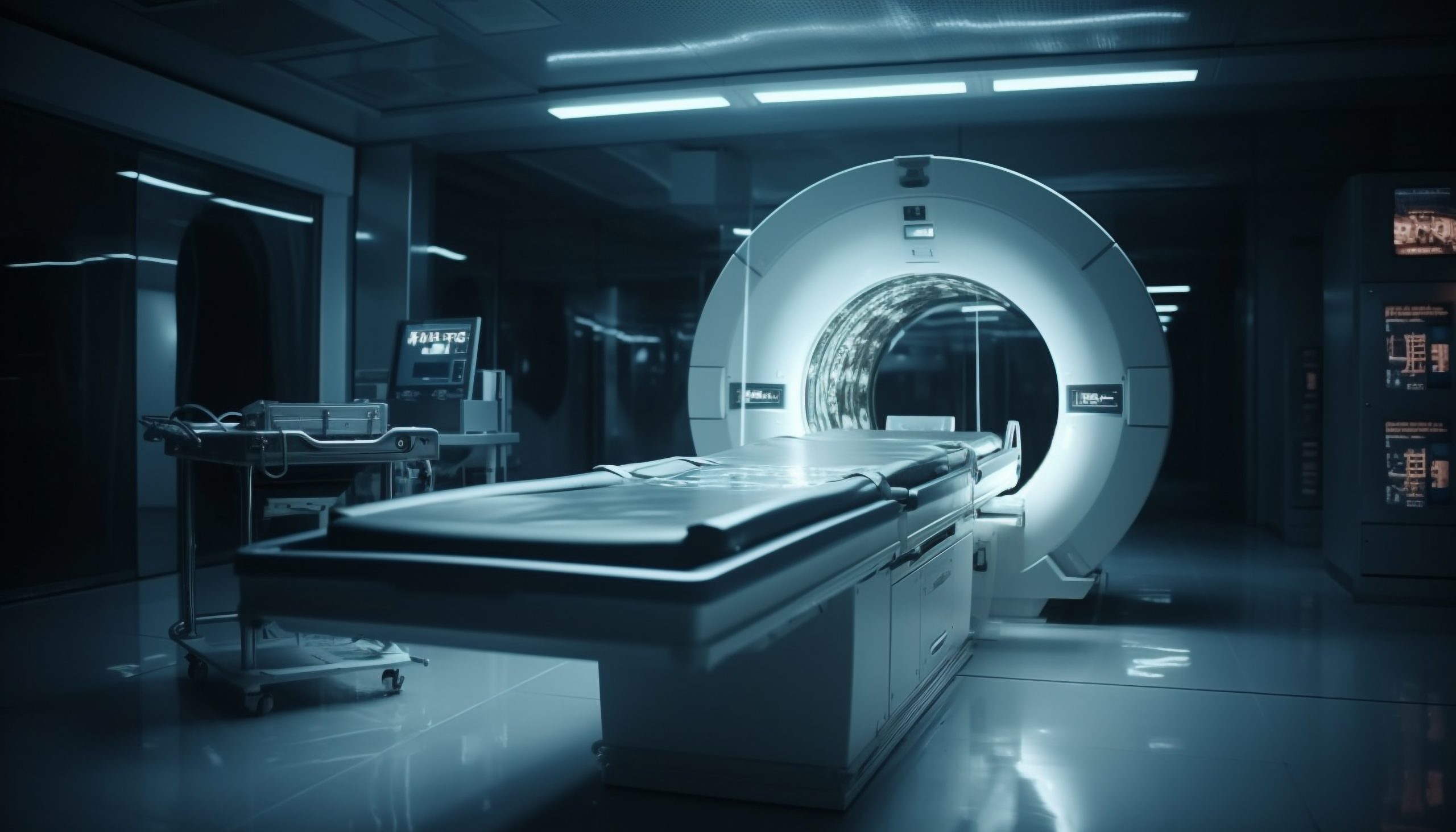Market Overview
The South Korea MRI scanners market is valued at USD 328.89 Million in 2025 with an approximated compound annual growth rate (CAGR) of 5.38% from 2025-2030, based on a comprehensive analysis of historical data. This growth is propelled by increasing investments in healthcare infrastructure, advancements in imaging technology, and a growing prevalence of chronic diseases requiring advanced diagnostic solutions. The demand for efficient imaging systems in hospitals is further driving market expansion, supported by favorable governmental health policies aimed at enhancing medical diagnostics and technological innovation.
Major cities like Seoul, Busan, and Incheon dominate the MRI scanners market due to their robust healthcare facilities and concentration of leading hospitals and universities. In particular, Seoul stands out with its high-density population and as a hub of medical research and innovation, while Busan’s growing healthcare sector and Incheon’s emerging medical facilities further contribute to the overall market strength in these regions.
The growing demand for diagnostic imaging is fueled by an aging population and a heightened awareness of preventive healthcare. The World Health Organization projects that the percentage of the population over 65 in South Korea will increase to 25.6 million by end of 2025, representing approximately 31% of the total population. This demographic shift continuously increases the demand for imaging services, particularly MRIs, as physicians seek effective non-invasive methods for diagnosing complex health conditions. Hence, the surge in demand for diagnostic imaging supports the growth trajectory of the MRI scanners market.
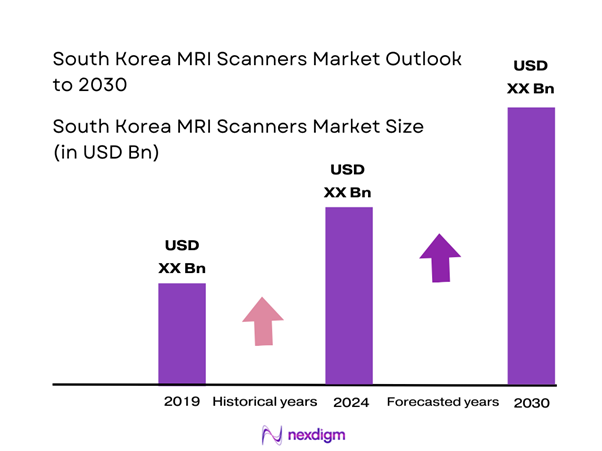
Market Segmentation
By Technology Type
The South Korea MRI scanners market is segmented by technology type into closed MRI scanners and open MRI scanners. Recently, closed MRI scanners have dominated market share due to their superior imaging quality and faster scan times. The demand for high-resolution imaging for precise diagnostics leads healthcare providers to prefer closed MRI systems, which are suitable for a broad range of medical applications, especially in neurology and oncology. Hospitals are increasingly investing in closed MRI technology to enhance their diagnostic capabilities, which fosters their dominance in the market.
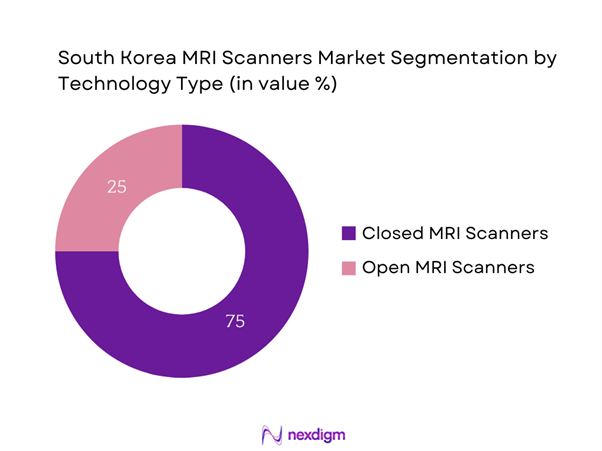
By Application
The market is also segmented by application into diagnostic imaging, research and development, and others. The diagnostic imaging segment holds a dominant share as it encompasses various medical fields including neurology, orthopedics, and cardiology. With a rising incidence of neurological conditions and an aging population, the demand for effective diagnostic imaging tools in hospitals has surged. The advantages of MRI in providing non-invasive and detailed images further reinforce its prevalence in medical diagnostics, making it the largest application segment.
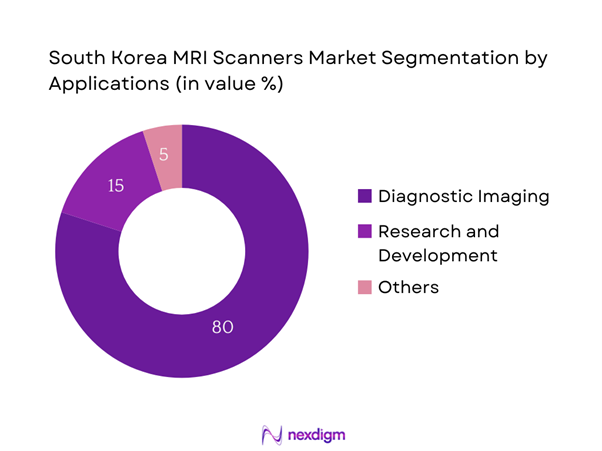
Competitive Landscape
The South Korea MRI scanners market is dominated by a few major players, including Siemens Healthineers, GE Healthcare, and Philips Healthcare. This consolidation highlights the significant influence of these key companies, which have established themselves through innovation and extensive distribution networks, thereby driving the growth of advanced imaging solutions in the region.
| Company | Establishment Year | Headquarters | Technology Expertise | Market Focus | Annual Revenue | Key Developments | Product Portfolio |
| Siemens Healthineers | 1847 | Erlangen, Germany | – | – | – | – | – |
| GE Healthcare | 1892 | Chicago, USA | – | – | – | – | – |
| Philips Healthcare | 1891 | Amsterdam, Netherlands | – | – | – | – | – |
| Toshiba Medical Systems | 1930 | Tokyo, Japan | – | – | – | – | – |
| Canon Medical Systems | 1933 | Tokyo, Japan | – | – | – | – | – |
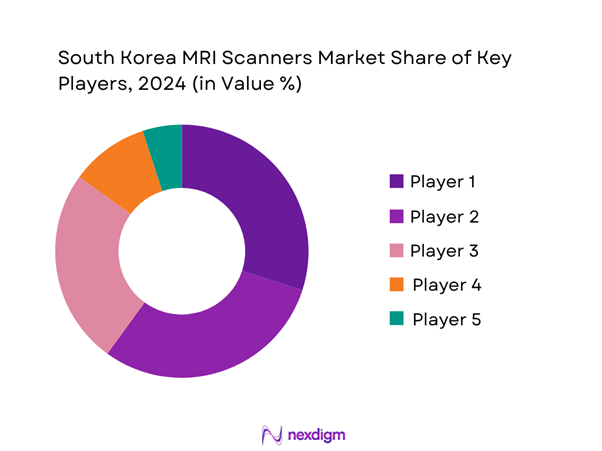
South Korea MRI Scanners Market Analysis
Growth Drivers
Increasing Incidence of Chronic Diseases
The increasing incidence of chronic diseases, particularly neurological disorders, is a significant growth driver for the South Korea MRI scanners market. According to the Korea Centers for Disease Control and Prevention, the number of stroke patients has increased, with over 120,000 new cases reported annually. Additionally, the prevalence of Alzheimer’s disease is projected to rise sharply as the population ages, with an estimated 1.5 million individuals affected by end of 2025 according to the Ministry of Health and Welfare. With chronic diseases necessitating advanced imaging for timely diagnosis, the demand for MRI scanners is projected to surge.
Advancements in MRI Technology
Advancements in MRI technology are transforming diagnostic capabilities, propelling market growth further. With innovations such as 3 Tesla and 7 Tesla MRI machines providing high-resolution imaging, hospitals are increasingly adopting these advanced systems. For instance, the number of ultra-high-field MRI scanners in operation in South Korea is expected to grow from 55 in recent years, as documented in the Korean Radiological Society reports, leading to enhanced diagnostic precision. These advancements create opportunities for earlier disease detection and improved patient outcomes.
Market Challenges
High Initial Investment Costs
One of the primary challenges in the South Korean MRI scanners market is the high initial investment costs associated with purchasing and maintaining MRI equipment. The average cost of a new MRI scanner ranges from USD 1 million to USD 3 million, a financial burden for many hospitals and clinics. Additionally, operational costs, which include maintenance, staffing, and technology upgrades, can exceed USD 400,000 annually. This significant financial commitment often limits access to advanced imaging technologies, especially in smaller healthcare facilities and rural areas.
Regulatory Hurdles
Regulatory hurdles present another challenge within the South Korea MRI scanners market. The stringent regulations imposed by the Korean Food & Drug Administration dictate comprehensive approval processes for new imaging technologies, including lengthy reviews and extensive documentation. In 2022, it was reported that the average time for receiving clearance for medical devices, including MRI scanners, was around 12-18 months. Such extended timelines can delay the introduction of innovative technologies into the market, resulting in a slower adaptation of advanced imaging solutions in clinical practice.
Opportunities
Expanding Medical Tourism
South Korea’s expanding medical tourism market presents significant opportunities for the MRI scanners sector. The country is increasingly recognized for its advanced healthcare services, with over 500,000 international patients visiting for medical care in 2022, a figure projected to continue growing. This influx is fueled by competitive pricing, high-quality medical care, and state-of-the-art technology. Facilities catering to medical tourists are more likely to invest in advanced imaging technologies, including MRIs, to attract international patients seeking cutting-edge diagnostic services.
Rising Demand for Hybrid Imaging
The rising demand for hybrid imaging solutions offers a promising opportunity for the MRI scanners market. Hybrid imaging systems, which combine MRI with other modalities such as PET scans, are becoming increasingly popular for their enhanced diagnostic capabilities. As of 2022, more than 30 hybrid imaging systems were operational in major hospitals across South Korea, showcasing a growing trend toward integrated diagnostic approaches. This demand is driven by a need for comprehensive diagnostics, especially in oncology and neurology, thereby enhancing the market for MRI scanners equipped with hybrid capabilities.
Future Outlook
Over the next five years, the South Korea MRI scanners market is expected to demonstrate significant growth driven by continuous technological advancements, increasing investments in healthcare infrastructure, and a rising demand for effective diagnostic imaging solutions. With an aging population and a greater prevalence of chronic illnesses, the emphasis on high-quality, non-invasive diagnostic tools will propel market expansion. Furthermore, the integration of artificial intelligence in imaging technologies is likely to enhance accuracy and efficiency in diagnostics, thereby shaping the future landscape of the MRI market.
Major Players
- Siemens Healthineers
- GE Healthcare
- Philips Healthcare
- Toshiba Medical Systems
- Canon Medical Systems
- Hitachi Medical Systems
- Neusoft Medical Systems
- Fujifilm Holdings
- Bracco Imaging
- Hologic
- Mindray
- Agfa-Gevaert
- Carestream Health
- Samsung Medison
- United Imaging Healthcare
Key Target Audience
- Hospitals and healthcare providers
- Diagnostic imaging centers
- Research institutions
- Government and regulatory bodies (Ministry of Health & Welfare, Korea Food & Drug Administration)
- Insurance companies
- Investments and venture capitalist firms
- Medical equipment distributors
- Professional medical associations
Research Methodology
Step 1: Identification of Key Variables
The initial phase involves constructing an ecosystem map encompassing all key stakeholders within the South Korea MRI scanners market. This step is underpinned by extensive desk research, utilizing a combination of secondary and proprietary databases to gather comprehensive industry-level information. The primary objective is to identify and define the critical variables and parameters that influence market dynamics, ensuring a clear understanding of the industry landscape.
Step 2: Market Analysis and Construction
In this phase, we compile and analyze historical data pertaining to the South Korea MRI scanners market. This includes assessing market penetration, the ratio of marketplaces to service providers, and resultant revenue generation. Additionally, an evaluation of service quality statistics is conducted to ensure the reliability and accuracy of the revenue estimates, providing a solid foundational understanding of market conditions.
Step 3: Hypothesis Validation and Expert Consultation
Market hypotheses are developed and subsequently validated through computer-assisted telephone interviews (CATIs) with industry experts representing a diverse array of companies. These consultations provide valuable operational insights and financial data directly from industry practitioners, instrumental in refining and corroborating the market data. The integration of expert opinions ensures that assumptions and conclusions are grounded in real-world experience.
Step 4: Research Synthesis and Final Output
The final phase involves direct engagement with multiple MRI scanner manufacturers to acquire detailed insights into product segments, sales performance, consumer preferences, and other pertinent factors. This interaction serves to verify and complement the statistics derived from the bottom-up approach, ensuring a comprehensive, accurate, and validated analysis of the South Korea MRI scanners market. The synthesis of findings results in a holistic view of the market landscape.
- Executive Summary
- Research Methodology
(Market Definitions and Assumptions, Abbreviations, Market Sizing Approach, Consolidated Research Approach, Understanding Market Potential Through In-Depth Industry Interviews, Primary Research Approach, Limitations and Future Conclusions)
- Definition and Scope
- Market Dynamics
- Historical Overview
- Timeline of Key Players
- Supply Chain Analysis
- Growth Drivers
Increasing Incidence of Chronic Diseases
Advancements in MRI Technology
Growing Demand for Diagnostic Imaging - Market Challenges
High Initial Investment Costs
Regulatory Hurdles - Opportunities
Expanding Medical Tourism
Rising Demand for Hybrid Imaging - Future Trends
Integration of AI in Imaging
Focus on Portable MRI Scanners - Government Regulation
Standards and Compliance in Medical Imaging - SWOT Analysis
- Stakeholder Ecosystem
- Porter’s Five Forces
- By Value, 2019-2024
- By Volume, 2019-2024
- By Average Selling Price, 2019-2024
- By Technology Type (In Value %)
Closed MRI Scanners
Open MRI Scanners - By Application (In Value %)
Diagnostic Imaging
Research and Development - By End-User (In Value %)
Hospitals
Diagnostic Imaging Centers
Research Institutions - By Geography (In Value %)
Seoul
Busan
Incheon - By Field of Imaging (In Value %)
Neurology
Orthopedics
Cardiology
- Market Share of Major Players on the Basis of Value/Volume, 2024
- Cross Comparison Parameters (Company Overview, Business Strategies, Recent Developments, Strength, Weakness, Organizational Structure, Revenues, Revenues by segment, Distribution Channels, Margins, Product Portfolio, Unique Value offering and others)
- SWOT Analysis of Major Players
- Pricing Analysis by Major Players
- Detailed Profiles of Major Companies
Siemens Healthineers
GE Healthcare
Philips Healthcare
Toshiba Medical Systems
Hitachi Medical Systems
Fujifilm Medical Systems
Canon Medical Systems
Esaote
Neusoft Medical Systems
Samsung Medison
Bracco Imaging
Hologic
Agfa-Gevaert
Varian Medical Systems
Mindray
- Users’ Demand and Utilization Trends
- Financial Capability and Budgeting
- Regulatory and Compliance Challenges
- Patient Experience and Satisfaction Factors
- Decision-Making Processes
- By Value, 2025-2030
- By Volume, 2025-2030
- By Average Selling Price, 2025-2030

